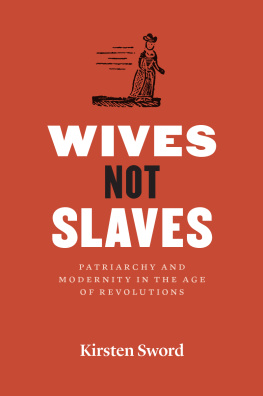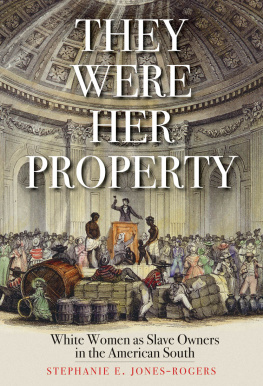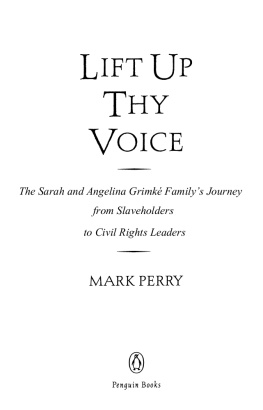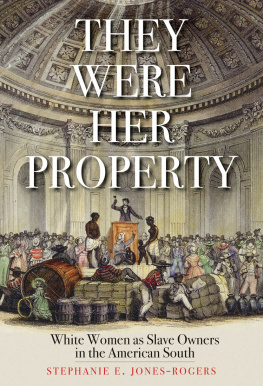Acknowledgments
Widowhood and slavery were both legal constructs in the early nineteenth-century Southeast, but Masterful Women is not primarily a legal (or quantitative) study grounded in statutes, court records, and will books. Instead, it explores the evolving relationship between widowhood, slaveholding, and mastery from the Revolution through the Civil War in Virginia, the Carolinas, and Georgia. In particular, it focuses on occasions and places in which slaveholding womens and mens roles in the Old South intersected, and it situates slaveholding widows distinctive blend of ladyhood and mastery within the larger political and economic history of the region and period.
I have relied on many different institutions and people for help along the way. For a decade now I have shared research, writing, teaching dilemmas, professional concerns, and food with a large circle of friends and mentors. Early on, I was blessed in my graduate school advisers. Drew Faust inspired me even before I began graduate school. Admittedly I did not pay her the ultimate compliment of dressing as her at a Come as Your Adviser party many years agoother, taller friends took on the chargebut I respect and admire her more than I can say. Richard Dunn helped me recognizeand I hope reconcilemany of the projects early problems, and his encouragement stood me in good stead on many occasions. Kathleen Brown came to Penn in time for me to benefit from her many insights about research, writing, and life in the profession. Each of them sets a formidable (even intimidating) standard for personal and professional achievement. But they are also great people to talk with over a coffee or a beer, which is equally important.
My friends deserve much of the credit for helping me conceive and complete this project. Beth Clement helped me articulate its central concept, and Allison Sneider has consistently forced me to stick to my guns in defending it. I owe Tony Iaccarino a debt of friendship for reading my first stabs at that frightening first chapter. Allison, Jason McGill, Jennifer Ritter-house, and Serena Zabin helped me throughout the dissertation-writing process. At different times in graduate school, Ellen Amster, Ed Baptist, Valentijn Byvanck, Seth Cotlar, Konstantin Dierks, Tom Humphrey, Hannah Joyner, Sarah Knott, Roderick McDonald, Seth Rockman, Mark San-tow, Randolph Scully, and Mark Wilkens prompted me to rethink, redefine, rewrite, and retrench. I have also received penetrating feedback at seminars and conference panels from many people, including Anne Firor Scott, Douglas Egerton, Catherine Clinton, Elizabeth Fox-Genovese, Eugene Genovese, Mike Zuckerman, Jane Turner Censer, John Boles, Dallett Hemphill, Patricia Cline Cohen, Mark Smith, Jeff Young, Stephanie McCurry, James Roark, and Lorri Glover. (Conferences also provide opportunities to catch up with old friends and make new ones, and I must particularly mention Dan Kilbride and Chris Olsen in that regard.)
Since moving to Miami, I have been nurtured, encouraged, and wellmeaningly mocked by my entire department, but especially by Darden Pyron, Mark Szuchman, Nina Caputo, Hugh Elton, Mitch Hart, Lara Kriegel, and Rebecca Friedman. I have also learned much from Peter Craumer, Carl Craver, Maureen Donnelly, Keith Dougherty, Mary Beth Melchior, Ken Rogerson, Robin Sheriff, and especially Margaret Kovera. Mark and Peter deserve special thanks for all their computing help. Elena Maubrey, Hayat Kassab-Gresham, Carmen Evans de Jesus, Camilla Samqua, and Vanessa Peterson have helped in many small but crucial ways with the daily business of academic life. Ed and Stephanie Baptist, Guy and Lois Bailey, David Chatfield, Camilla Cochrane, Bonnell Denton, Thomasine Morris, Wes Walker, Willie Allen-Faella, and my fellow choristers at St. Stephens have helped me look beyond the academy. Most recently, Tom Leness has enriched my life by introducing me to Jack Aubrey and Steven Maturin, and in several other ways besides. Even with all this local talent, I have depended upon the long-distance support of Bonnie Gordon, who deserves a medal for reading so many drafts and for being available for 7:00 A.M. consultations.
During a semester of course release from Florida International University, I squatted at the McNeil Center for Early American Studies in Philadelphia, where Niki Eustace, Matt Hale, Brooke Hunter, Brendon McConville, Randolph Scully, John Smolenski, Colleen Terrell, and Mark Thompson provided the camaraderie and hard questions that I have come to expect from that institution. I owe its director, Dan Richter, a great debt for allowing me to return to my former intellectual home. Lynn Lees offered me visiting scholar status at Penn, and Hannah Poole and Amy Baxter helped me get that all-important resource: a library card. Best of all, I got to spend six months in the company of old friends, Beth, Ellen, Mark, Randolph, Laurie Drummond, Michele Zelinsky, and Ann Greene.
I have had nearly as many sources of institutional support as friends and mentors. A Ben Franklin fellowship and a Chimicles teaching fellowship supported me during graduate school at the University of Pennsylvania. I have also received financial support from Duke Universitys Womens Studies Research Grant, the Mary Lily Research Fund, the Virginia Historical Society, as well as from the Provosts Office, the College of Arts and Sciences, and my own department at FIU. Like every researcher, I relied on archivists and archival staff, especially those at the Southern Historical Collection at the University of North Carolina at Chapel Hill, the Special Collections Library at Duke University, the Virginia Historical Society, the South Caroliniana Library at the University of South Carolina, the Library Company of Philadelphia, the Rare Books and Manuscripts Library at Columbia University, and the Mormon Family History Research Center in Broomhall, Pennsylvania. I remember the folks at the Southern Historical Collection with particular fondness for spontaneously resurrecting the barter system: photocopies for cookies. I owe a great debt to the anonymous readers for the UNC Press and to my editor, Chuck Grench. Amanda McMillan, Pamela Upton, and Eric Combest also helped in many ways to bring this project to completion.







